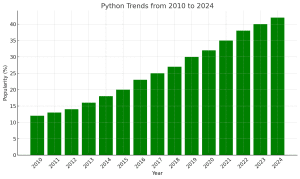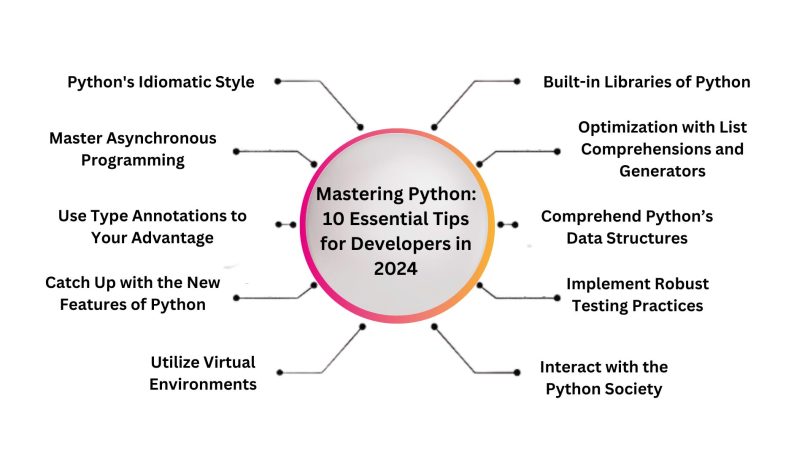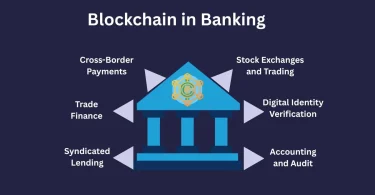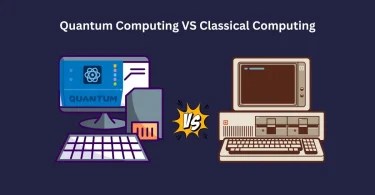Discover 6 top tips to master in Python in 2024. From focusing your learning to working on real projects, these proven strategies will help you master Python and accelerate your coding journey .Why Python has become so popular and used widely in various domains? The answer is simple; because of its flexibility and simplicity. The universality of Python in various fields is proof that developers should not sacrifice the readability, functionality, and sustainability of the code for other attributes.
To go on board in the process of mastering Python is to set out on a mission that is like an endless plain. It is easy to learn but moving from writing simple scripts to being an expert in Python is not just about the syntax; it also involves commitment, soft/hard work and precision. Here are ten essential tips for developers that will help you on your way to becoming a Python master.
Python Trends From 2010 To 2024

To Become Master in python Tip & Tricks
Python’s Idiomatic Style
It is well known to be a clean language and is very important to stick to the idiomatic style which is often referred to as the Zen of Python. It is advised to get acquainted with PEP 8-style Python’s code standard and try to write rather clean and comprehensible code. This includes using meaningful variable names, consistent indentation and avoiding the use of complex expressions.
Built-in Libraries of Python
It has an enormous standard library that includes modules and functions for file input and output, mathematical computation, etc. For case in point, if you are in need of iterator functions, you can use itertools; if you need specialized container types, collections; if you need higher-order functions, functions; mostly everything is available in its libraries. Before going for outside packages, it is always good practice to check python libraries.
list of some key built-in Python libraries
Here’s List of python Libraries to understand
- os
- sys
- math
- datetime
- json
- re
- random
- collections
- itertools
- functools
- path
- subprocess
- shutil
- threading
- time
Master Asynchronous Programming
As real-time applications and services gain more popularity. Python’s asynchronous library helps you write concurrent code with the help of asynchronous and await keywords. This is particularly helpful for I/O-intensive operations like web scraping, managing several web requests, or interacting with databases. This knowledge will help you to greatly enhance the efficiency of your applications that are based on asynchronous.
Optimization with List Comprehensions and Generators
List comprehensions and generators are two extremely useful features of Python that enable the writing of compact and memory-friendly code. List comprehensions are for lists, but generators are better when you work with big data because they do not create all items at once, but one by one. By 2025, developers should be able to harness these tools to write effective Python code that is equally optimized.
Use Type Annotations to Your Advantage
Python 3.5 brought type annotations and they have gradually gained relevance in large code bases where maintainability and prevention of bugs is the key. By declaring the type of the variables, function arguments and return values you make your code more comprehensible and debuggable.
Comprehend Python’s Data Structures
Selecting the right data structure is very important when it comes to the performance of your code. Python provides several standard data types, including lists, dictionaries, sets and tuples; each of which has its advantages and disadvantages. Developers should understand when to apply these data structures and how to do it correctly. For example, use dictionaries for immediate searches, sets for collections without duplicates, and tuples for unchangeable sequences.
Catch Up with the New Features of Python
It is a dynamic language that is being updated with new features and optimizations with each new version. It is important to keep abreast of these changes to be able to make the best use of the latest technologies. To be updated, you can always go through the release notes of Python and engage in community forums.
Implement Robust Testing Practices
Testing is one of the most essential steps in the creation of software and the Python language has the unittest, pytest, and doctest frameworks for this. The use of TDD practices will enhance the reliability and maintainability of the code. Concentrate on unit tests, integration tests, and end-to-end tests to make sure that the application is thoroughly tested.
Utilize Virtual Environments
Virtual environments enable you to work on your projects in different spaces where the dependencies do not interfere with each other. It would be practically impossible to do without tools like venv or virtualenv, and pipenv, which combine the management of dependencies and environments.
Interact with the Python Society
This is a friendly and open-source language community in the programming world. Interacting with the community via mailing lists or online, on GitHub, Stack Overflow, or going to meetings and conventions such as PyCon would assist learning. One can enhance professional level by contributing to open-source projects, engaging in hackathons or even creating one’s own Python blog.
Python Library Comparison Chart
We have created and displayed a comparison chart of popular Python libraries based on real data, including their purposes, popular use cases, learning difficulty, and the best projects to use them for
| Library | Purpose | Popular Use Cases | Learning Difficulty | Best For |
| NumPy | Numerical computation | Handling arrays and matrices | Moderate | Data science, Scientific computing |
| Pandas | Data manipulation and analysis | Data frames and structured data manipulation | Moderate | Data analysis |
| Matplotlib | Data visualization | Graphs, charts, plots for data | Easy | Visualizing data |
| Scikit-learn | Machine learning | Predictive modeling, classification, clustering | Moderate | Machine learning and AI |
| Django | Web development (full-stack) | Full-scale web apps with built-in features | Challenging | Large web applications |
| Flask | Web development (micro-framework) | Small-scale web apps, APIs, and microservices | Easy | Lightweight web apps, APIs |
Conclusion
To bring about true mastery of Python in the years 2024-2025, one has to be both technically sound as well as abreast with the latest practices that are followed in the industry. This is why by following the idiomatic style of Python, using libraries provided with it, knowing how to work with asynchronous programming and using list comprehensions and generators you can write the efficient and maintainable Python applications. Furthermore, upgrading yourself with the new features in Python, regular practice in testing, using a virtual environment, and participating in the Python community forums will make you more confident Python developer. If you want to enhance your coding skills and are ready to take on more difficult problems, the above tips will help you in the fast-growing Python/coding environment.




Leave a Comment